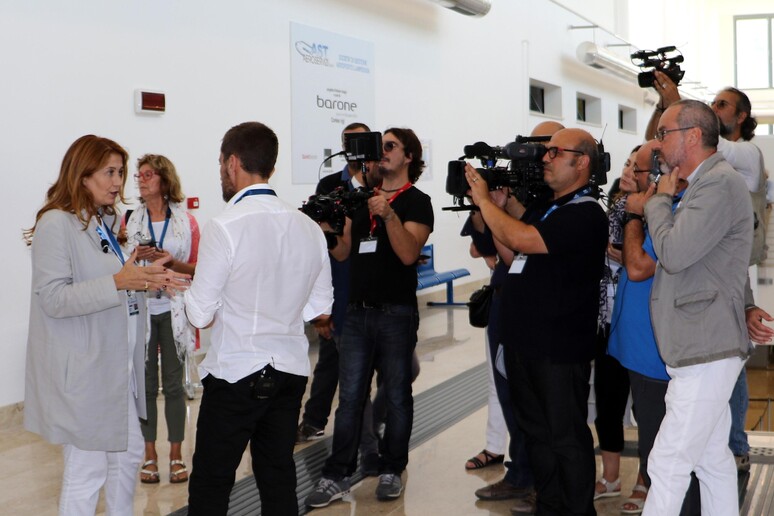How Europe is questioning
itself about migrant issues, the role of the news media and its
own cultural and historic legacy was shown in the entries taking
top honours at the 68th Prix Italia, which drew to a close on
Sunday October 2 on Lampedusa.
In the TV, Radio and Web competitions, Britain (three
prizes and a special mention) won the day together with France
(two prizes and a special mention), while the remaining awards
were shared between Switzerland, Norway, Holland and Denmark.
Romania received a special mention.
In television, it was a BBC documentary which took the
limelight.
"Exodus: Breaking into Europe" by James Bluemel won the TV
documentary category as well as the Special Prize of the
President of the Italian Republic.
It reported on migration from Syria by handing out camera
phones to the migrants themselves.
In the jury's opinion "the film gives dignity and a
humanity to the migrants. This documentary is essential now and
for the future, and gives hope to the world too".
It was also a British Channel 4 entry that took the podium
in the TV drama section with "Cyberbully" that the jury judged
to "successfully represent an actual global social issue in a
visual innovative and formal original way".
The special mention went to France 2's "Don't Leave Me".
The best entry as far as the Performing Arts jury was
concerned was Holland's "Paolo Ventura. The Vanishing Man"
directed by Erik van Empel for NPO.
"It is an unexpected journey" wrote the jurors "into a
timeless world. Thanks to the director we were drawn into the
life of a unique illusionist and his magical world of images".
In the same section, the special mention went to the BBC's
"Rudolf Nureyev - Dance to Freedom".
In radio, France's Arte Radio programme walked away with
the top Radio and Documentary prize with Olivier Minot's "The
Revolution Will Not Be Podcast".
"The piece", according to the jury motivation, "reflects
through imaginative use of archive material - upon the
contemporary state of political action and the role of the
journalist in a personal and honest way".
France, with Radio France, was also the winner in the
Radio Drama category with "Grief", directed by Caroline Guiela
Nguyen, Alexandre Plank, Antoine Richard.
The jury viewed that the entry "explores the relationship
between a woman and her brother through the prism of their
father's death, with highly skilled naturalistic truthful
performances. A persuasively demanding play that gently forces
the listener to confront the many faces of inescapable grief".
In the same section, there was a special mention for the
Rumanian Broadcaster ROR's "The Black Bible of William Blake".
In the Radio Music section, NRK of Norway triumphed with
GuriSkeie's "The Song of Nature Which I Can Sing. On Wild Roads
in Tuva".
This is a travel documentary about the traditional throat
singing among the people of Tuva, a small republic in Siberia.
The jury particularly admired the programme because "a
personal, laid-back narration guides us through their nomadic
culture and how it affects the producer".
In the Web section, Switzerland with Rts's "Exils" by
NicolaeSchiau (http://www.rts.ch/info/monde/7073655-exils.html)
prevailed with its focus on the migration issue.
"This project" reads the jury report "demonstrates how
public service media can efficiently and effectively blend old
and new technology to increase the impact of journalism".
With regards to the special prizes, "Exodus: Breaking
Into Europe" was celebrated once agains when it was awarded the
Special Prize of the President of the Italian Republic with a
jury chaired by Mayor of Lampedusa and Linosa Giusi Nicolini.
The BBC programme, maintained the jury, "innovatively,
movingly and devoid of rhetoric records the terrible
consequences of the war in Syria and the journey undertaken by
thousands for Europe".
Refugees fleeing war-torn Syria were also at the centre of
the winning SIGNIS prize documentary directed Line Hoeck, Mai
Rasmussen, Jakob Rasmussen and entered by Danish Broadcaster DR.
According to the jury motivation "the documentary gives a
voice to refugees fleeing from Syria to Europe, talking to their
loved ones who stayed at home".
Finally, at this year's Festival, Prix Italia, in its
latest cooperation with the Ministry of Education, University
and Research, celebrated the best "Europe Begins in Lampedusa"
Project. The Galileo Galilei school in Trieste was judged the
winner with its entry "No Island is Just an Island".
ALL RIGHTS RESERVED © Copyright ANSA











